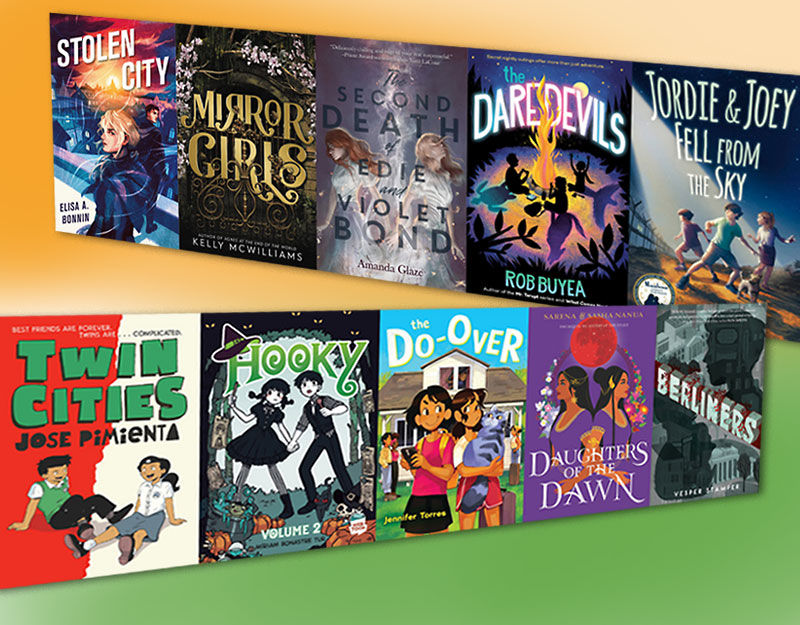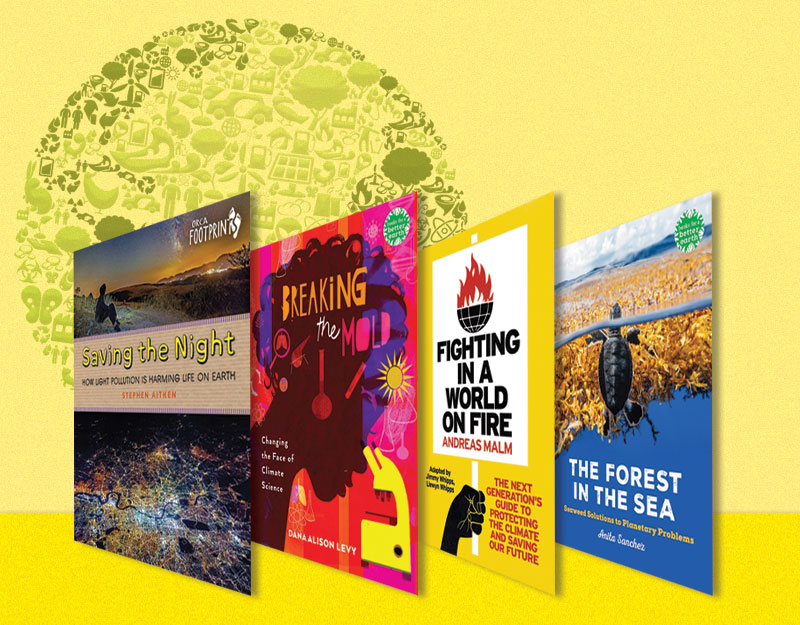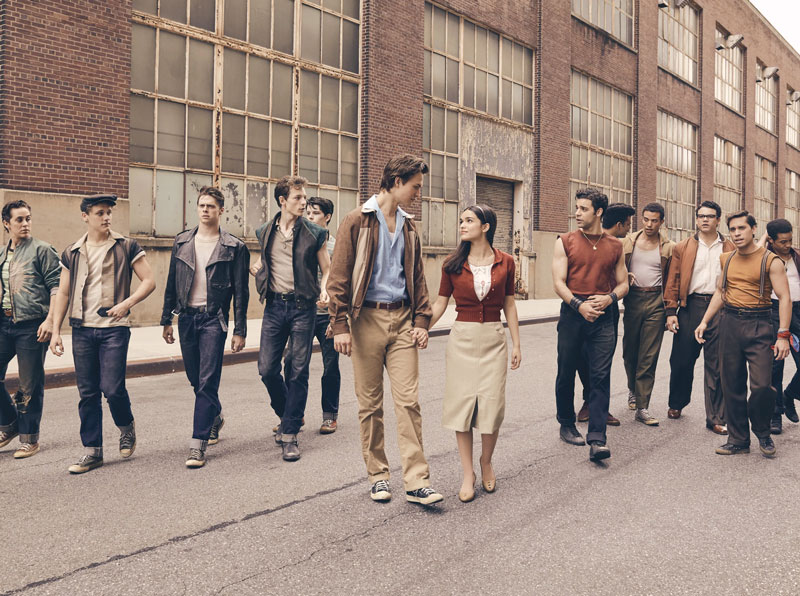#ReadForChange: Jodi Lynn Anderson’s Midnight at the Electric and climate change, a guest post by Marie Marquardt
 Teen Librarian Toolbox is excited to be partnering with Marie Marquardt for her #ReadForChange project. Hop on over to this post to learn more about the initiative. Today, she and Jodi Lynn Anderson join us for a conversation about climate change and Anderson’s new novel, Midnight at the Electric.
Teen Librarian Toolbox is excited to be partnering with Marie Marquardt for her #ReadForChange project. Hop on over to this post to learn more about the initiative. Today, she and Jodi Lynn Anderson join us for a conversation about climate change and Anderson’s new novel, Midnight at the Electric.
We stand now where two roads diverge. But unlike the roads in Robert Frost’s familiar poem, they are not equally fair. The road we have long been traveling is deceptively easy, a smooth superhighway on which we progress with great speed, but at its end lies disaster. The other fork of the road – the one less traveled by – offers our last, our only chance to reach a destination that assures the preservation of the earth.
Rachael Carson, Silent Spring, 1962
A Smooth Superhighway that Ends in Disaster?
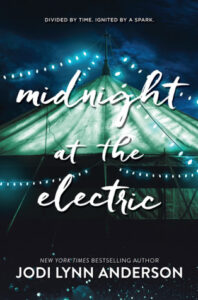 Jodi Lynn Anderson’s Midnight at the Electric begins with Adri, one of the story’s three teenage protagonists, climbing into her self-driving car and speeding north on a superhighway away, from Miami and toward Kansas. The year is 2065 and Miami has been submerged in seawater. Leaving her devastated city behind, Adri sets out for a brief stint in Kansas, where she will train to be a “colonist” before heading off to Mars.
Jodi Lynn Anderson’s Midnight at the Electric begins with Adri, one of the story’s three teenage protagonists, climbing into her self-driving car and speeding north on a superhighway away, from Miami and toward Kansas. The year is 2065 and Miami has been submerged in seawater. Leaving her devastated city behind, Adri sets out for a brief stint in Kansas, where she will train to be a “colonist” before heading off to Mars.
ADVERTISEMENT
ADVERTISEMENT
In the hands of a less innovative author, this might be the setup for a futuristic science fiction novel that takes the reader to an imagined place far away from this planet. In the hands of Jodi Lynn Anderson, Adri’s escape from Miami sets up something entirely different. We might call it a love story to the planet earth, and to the relationships that we build on its particular landscapes.
Adri arrives in Kansas to live with a distant relative, the fabulous, flaky 107-year-old Lily, and Lily’s ancient Galapagos tortoise. When Adri sanctimoniously announces that Galapagos tortoises are endangered, and thus it’s illegal to have them as pets, Lily replies with her mischievous humor, “We should have her arrested.” Lily inherited the tortoise – she came along with the property. As Adri learns more about the history of this ancient creature, she begins to uncover the two stories that weave together with Adri’s to form Midnight at the Electric.
The first story is Catherine’s. Her diary entries bring readers into the devastation of living in Oklahoma’s dust bowl in the mid 1930s. Catherine’s sister is being slowly suffocated by dust in her lungs, and the farm they live on can no longer sustain the family. When a traveling show called the Electric comes through Catherine’s town, she’s lured into the promises made by its creator: “It is a time of upheaval and uncertainty. The world is changing beneath our feet. Death is around every corner. Fear and despair lurk in every house…. But it is possible to outrun it, to outstrip it, to outsmart it.”
Like Catherine, the story’s third protagonist, Lenore, lives in a world transfixed by the power of human technologies. Lenore, a young woman living in England at the end of World War I, grieves the death of her brother, a fallen British soldier, as everyone around her seems bent on hailing technologies of war and “progress” and celebrating the bravery of the dead and wounded men. In her wonderfully irreverent tone, Lenore writes to her friend Beth of her village: “If you toss a pebble in Forest Row, you’re going to hit a one-armed boy.” Through her letters to Beth, Lenore tells a beautiful and morally complicated story of her friendship with James, a man whose face is so disfigured that most instinctively turn away.
This week, I heard a disturbing report about mounting evidence that the U.S. federal government is systematically removing, in scientific studies, any reference to human causes of climate change (you can listen here). This, of course, followed weeks of reporting about Facebook, and the unintended (I hope!) consequences that this technology has had on our political systems and our networks of relationship. I think our natural instinct, when faced with these stories, is either denial or guilt. Both are counterproductive and crippling. Midnight at the Electric, by framing these issues both in real history and in imagined future, offers us a way to enter more productively into discussion of humans’ influence on climate change, and of how technology inevitably changes the ways we relate to each other.
Lenore and Catherine give readers a chance to live in times that, like ours, were so enamored with technologies of “progress” that it was almost impossible to imagine the negative effects they would have on our planet and on our relationships (until it was too late). Adri discovers, through the course of this story, that she doesn’t want to leave the earth and the loving relationship she has formed on it. But will she have to?
I guess that depends on us.
“Leveraging what you’re good at and what you love to do”: A Conversation with Jodi Lynn Anderson
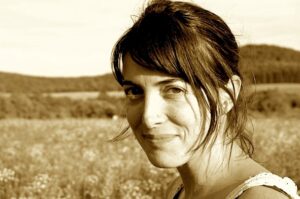 MARIE: Tell us about the moment when you knew that this story had to be written, and that you needed to be the one to write it.
MARIE: Tell us about the moment when you knew that this story had to be written, and that you needed to be the one to write it.
JODI: My son had recently been born and I was feeling a bit delirious and dreamy. I wanted to write about climate change but what was really digging into my imagination was the Dust Bowl. I kept picturing this girl standing in a decimated yard in Kansas, but I didn’t know what to say about her, and it was only when I started to nestle the two ideas together that the book flamed to life in this magical way. The more I wrote, the more I recognized the parallels between the Dust Bowl and our current climate crisis– the same upheaval, the same denial and anger, the same fear. And I saw these women navigating it — I just fell in love with writing that story.
MARIE: What are some of the things you’re doing to create the world that you want future generations to live in?
JODI: I try to write about our capacity for doing harm without meaning to, that’s a big thing for me as a writer. I try to be a good listener and to call myself out and put my ego aside as much as I can — I feel like defensiveness and not wanting to admit what we’re doing wrong is at the root of so much terrible stuff. I try to trust that just because I don’t see an obvious result, it doesn’t mean my efforts – volunteering or donating or marching or calling whatever — aren’t feeding a current that points the right way.
MARIE: What’s your message for readers wanting to take action on climate change?
JODI: I think focusing locally can be rewarding in that often you get to see results. Local groups need so many divergent things that I think you can offer the best of who you already are. So maybe that means you pick a few things that are draining, like phone calls or whatever, but you find a group where you can spend the rest of your energy leveraging what you’re good at and what you love to do. I guess I’d say also, the big thing I always struggle with is not to turn away because what you’re doing feels so tiny. I think we can’t lose faith because what we do doesn’t make some obvious splash.
“Feeding a current that points in the right way”
Ready to learn more? Jodi recommends that a great starting place is Grist – a nonprofit environmental news outlet with this fabulous tagline: “A planet that doesn’t burn, a future that doesn’t suck.”
Here’s a link to two podcasts that Jodi loves:
 No Place Like Home: This is a great, conversational podcast covering different angles of climate change and culture, and offering examples of people taking positive, achievable steps to create a better future.
No Place Like Home: This is a great, conversational podcast covering different angles of climate change and culture, and offering examples of people taking positive, achievable steps to create a better future.
 Warm Regards: This one has some fascinating stuff untangling how climate change has become so political.
Warm Regards: This one has some fascinating stuff untangling how climate change has become so political.
Jody also recommends From the Ashes, a documentary about the coal industry that she describes as “beautifully empathetic and smart.”
“We can’t lose faith because what we do doesn’t make some obvious splash”
Ready to take action? Here’s Jodi’s description of a few movements and organizations that really excite her:
“350.org uses all sorts tools and pressure points to shift our fossil fuel economy to renewable energy.”
 “Earthjustice focuses on our legal rights to sensible legislation on climate, working legal channels to combat political inaction.”
“Earthjustice focuses on our legal rights to sensible legislation on climate, working legal channels to combat political inaction.”
“The Poor People’s Campaign is something intriguing and inspiring I learned about a few months ago – it addresses the intersection of poverty, racism, and environmental devastation through the idea of a moral movement.”
“I get excited to hear about faith-based climate action groups. Young Evangelicals for Climate Action, NC Interfaith Power & Light, and Wisconsin Green Muslims are a few examples. Also, state action initiatives seem really powerful to me. In North Carolina we have NC Warn, among others.”
“The book flamed to life in this magical way”
ADVERTISEMENT
ADVERTISEMENT
I’m so grateful to Jodi for writing this beautiful and stirring story. Reading it also felt magical, and it sparked my memories, emotions, and passions for change in ways I hadn’t expected.
In our interview, Jodi also brought up the importance of working for change by using our own gifts and doing the things that we love. Other authors I’ve interviewed for the feature have talked about this too. I think it’s so important to celebrate that working for change doesn’t mean doing something grueling or miserable – it means embracing our gifts and finding ways to do the things we love as a way to become change agents. This takes creativity and vision, and that’s all a part of the fun.
Thank you, Jodi, for this reminder!
Midnight at the Electric is sure to ignite your passion to #ReadForChange!
Can’t wait to get your hands on MIDNIGHT AT THE ELECTRIC? It just might be your lucky day! Here’s a link to the giveaway. U.S. only! We’ll be announcing the winner on Twitter @MarieFMarquardt and Instagram marie_marquardt May 1!
Meet Marie Marquardt

Marie Marquardt is the author of three YA novels: The Radius of Us, Dream Things True, and Flight Season (available 2/20/18). A Scholar-in-Residence at Emory University’s Candler School of Theology, Marie also has published several articles and co-authored two non-fiction books about Latin American immigration to the U.S. South. She is chair of El Refugio, a non-profit that serves detained immigrants and their families. She lives with her spouse, four kids, a dog and a bearded dragon in the book-lover’s mecca of Decatur, Georgia.
Filed under: Uncategorized
About Amanda MacGregor
Amanda MacGregor works in an elementary library, loves dogs, and can be found on Twitter @CiteSomething.
ADVERTISEMENT
ADVERTISEMENT
SLJ Blog Network
One Star Review, Guess Who? (#202)
Review of the Day: My Antarctica by G. Neri, ill. Corban Wilkin
Exclusive: Giant Magical Otters Invade New Hex Vet Graphic Novel | News
Parsing Religion in Public Schools
ADVERTISEMENT





